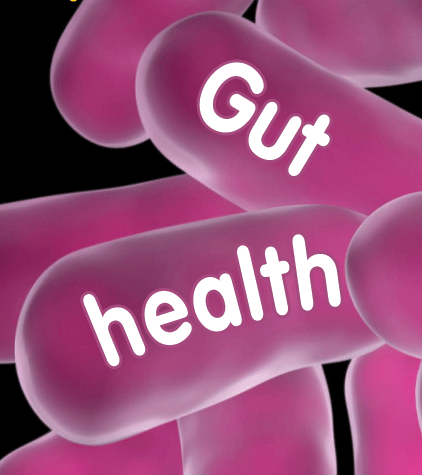Focus on IBS - by Katy Stuart, RD

Irritable bowel syndrome is a condition that affects the digestive system, causing bloating, cramping, diarrhoea, and/or constipation.[1,2] It is estimated that about 2 in 10 people in the UK have IBS. [3] There are three different types of IBS:[3]
IBS-C – mainly experience constipation and hard stools
IBS-D – mainly experience diarrhoea and loose stools
IBS-M/IBS-A – a mixture of symptoms from type C and type D
For those with IBS, these symptoms can be very distressing and disruptive to day-to-day activities and can take their toll on quality of life and well-being. Frustratingly, there is often no cause found, and it is thought to be related to how food passes through the gut.[4] This is known as the gastrocolic reflex. [5] For some people, this reflex is too strong and the colon can squeeze too fast or too strongly after food is eaten, causing pain and bloating.[4,5] This can be impacted by stress, which affects the nerves of the gut known as the gut-brain axis connection.[1,6,7] Sometimes food intolerances are present, such as lactose, gluten, or wheat.[6,7] Symptoms can come and go and are variable. There is no known cure, but it can be managed with dietary and lifestyle changes and some medications, which can help with symptoms.
What causes IBS?

As already mentioned, there is often no cause identified, and it is more likely to occur in families with a history of IBS. Possible causes that have been theorised to precipitate IBS include the following:[1,3,4,8,9]
Gastroenteritis – 10% of IBS sufferers develop symptoms after a stomach bug.
Changes in the gut microbiome, eg, taking antibiotics can disrupt the normal gut microflora.
Increased gut sensitivity – problems with the nervous system, eg, excess stress and anxiety can make some people ultra-sensitive to everyday abdominal changes.
A faulty gut-brain connection – the muscles in your intestines move food through the gut, but if the messages between the gut and brain become disrupted, food may pass through too quickly (diarrhoea) or too slowly (constipation)
Factors that can increase your risk of developing IBS include:
Travellers’ diarrhoea/food poisoning
Gender (females are more likely to suffer from IBS than males)
History of anxiety or depression
Stress
Genetics
Diagnosis of IBS
It can be tricky to diagnose IBS due to its varying symptoms and unpredictability. According to NICE guidance with the use of the Rome III criteria, IBS should be considered if there is abdominal pain/discomfort associated with bowel movements and/or a change in bowel habit involving two or more of the following symptoms:[5,6,8-10]
Altered stool passage (straining, urgency, incomplete evacuation)
Abdominal bloating (more common in women than men), distension, tension or hardness
Symptoms made worse by eating
Passage of mucus
Other symptoms that can occur include fatigue, bladder symptoms, nausea and backache.[6]
IBS symptoms can be like those of inflammatory gut diseases such as Crohn’s disease or ulcerative colitis, so it is important to rule out such conditions first. For example, a faecal calprotectin level to show inflammation in the gut, and a blood test for IgA tissue transglutaminase antibody (tTGA) and total IgA to rule out coeliac disease.[6,10,11] Other blood tests usually done as a screening for bowel disorders include full blood count to check for anaemia and erythrocyte sedimentation rate (ESR) and C-reactive protein (CRP) to check for infection and inflammation.[6,10] Food allergy tests should not be used to evaluate food intolerances in IBS patients.[5]
Any red flag symptoms alongside abdominal symptoms such as gastrointestinal bleeding, severe watery diarrhoea, fever and/or weight loss should be investigated urgently. Once these other conditions have been ruled out, the diagnosis of IBS is made.[6] Invasive tests such as ultrasound, sigmoidoscopy, colonoscopy or endoscopy are not necessary to confirm IBS and are only required to investigate other GI diseases with red flag symptoms. [6,10]
Treatment for IBS
NICE guidance advises that primary care clinicians should provide those with newly diagnosed IBS, information on diet and lifestyle changes, focusing on self-managing symptoms.[6] This general diet advice includes: [5-8,12]
· Have regular meals and do not rush meals.
· Avoid having long gaps between eating.
· Drink at least eight cups of fluid per day, especially water and avoid fizzy drinks.
· Reduce or avoid caffeinated drinks, such as tea, coffee and cola.
· Reduce or avoid alcohol.
· Limiting very high-fibre foods, such as wholemeal bread, wholegrain cereals and foods containing insoluble fibre such as bran, can help if bloating and diarrhoea are present.
· Reduce what is known as 'resistant starch', which is starch that is not digested in the small intestine and enters the large bowel intact. This is found in processed or re‑cooked foods.
· Choose cooked vegetables more often than raw, as cooked vegetables are easier to digest.
· Don't have too much fresh fruit (not more than three 80g portions a day).
· Avoid foods and drinks with artificial sweeteners, such as sorbitol or xylitol, that can worsen diarrhoea symptoms.
· Soluble fibre such as ispaghula powder, oats (such as oat‑based breakfast cereal or porridge) and linseeds can help with bloating and constipation.
It can be very helpful to keep a food diary to try and identify possible dietary (and lifestyle) triggers.[3]
Let’s focus more on IBS and diet
IBS is not caused by diet; however, certain foods can affect the symptoms. Reported common IBS trigger foods include: [5,12]
Legumes such as beans, lentils, chickpeas
Brassicas such as cabbage and kale
Onions
Sugars such as fructose and lactose
Wheat and/or gluten
Barley
Oats
Nuts, seeds and popcorn
High-fat foods
Caffeine
Alcohol
Spicy foods
Raw fruits and vegetables
Prunes
Artificial sweeteners such as sorbitol, mannitol, xylitol, maltitol and erythritol
According to the IBS dietary algorithm, if this first-line advice is not helping remission of symptoms, then second-line advice should be trialled.[7] This includes food avoidance and food exclusion diets, eg, elimination diet, low-FODMAP (fermentable oligosaccharides, disaccharides, monosaccharides and polyols) diet.[6,7,13] These treatments should only be provided by a ‘healthcare professional with expertise in dietary management’, which ideally would be a registered dietitian or nutritionist with the appropriate experience. [5,6]
Other dietary treatments that have limited evidence include:[2,16]
· Magnesium
· Herbal Teas, peppermint and green tea
· Peppermint oil -this has been established as a safe and effective option for IBS relief
Healthcare professionals should discourage the use of aloe vera in the treatment of IBS, as there is very little evidence for its efficacy.[6]
Second-line treatment options
THE LOW-FODMAP DIET
This is a short-term ‘diagnostic’ diet to identify food triggers. The aim is to reduce foods high in fermentable oligosaccharides, disaccharides, monosaccharides and polyols, such as apples, cherries, plums, garlic, leeks and onions, grains and cereals, legumes and beans and dairy products, etc. [13]
Points to consider:
This diet requires three- to six-week restriction of all FODMAP foods. Then, if GI symptoms improve, each food group is reintroduced one at a time over the next few weeks to help identify which foods are triggers.
It has been shown to reduce IBS symptoms in 75% of people with IBS [13]
It’s an individualised approach.
The diet is not recommended to be followed in the long term, but rather to help those with IBS identify what high-FODMAP foods they need to avoid [7]
THE ELIMINATION DIET
Elimination diets are short-term diagnostic diets used to identify foods to which you may be sensitive or intolerant, such as lentils, eggs or gluten. The point of an elimination diet is to avoid a certain food for around one month to see if symptoms improve, then reintroduce to see if symptoms occur again.[14]
Points to consider:
If it is not strictly adhered to, it will not be definitive and should only be followed under the guidance of a dietitian to ensure that there are sources of nutrients and vitamins. [14]
Neither the elimination nor low-FODMAP diets are advisable for those with a low BMI, ongoing weight loss or nutritional deficiencies. [5]
THE GLUTEN-FREE DIET
This involves avoiding gluten-containing foods such as wheat, barley and rye, such as bread, pasta, cereals, crackers, cakes and biscuits. [5]
Points to consider:
There is not much evidence for gluten restriction for IBS management, but it has been reported that 20% of IBS patients found relief from symptoms with a gluten-free diet [5]
Wheat is a high-FODMAP food, so it could be argued that the benefits of a gluten-free diet in IBS are due to the lower FODMAP content rather than gluten specifically. [5]
THE LOW-HISTAMINE DIET
Histamines are found in preserved and fermented foods such as some canned foods, cheese and alcohol [5]
Points to consider:
There are health conditions linked to elevated histamine levels, such as mastocytosis, where mast cells accumulate and cause organ damage.[15] However, it is not clear of its relevance in IBS. [5]
Probiotics

Probiotics contain so-called ‘good bacteria’ which help maintain the bacterial flora in the gut and can help with symptoms of IBS.[2] Probiotics are available as supplements and can be found in foods such as live yoghurt, cultured dairy products and fermented foods.[2,3,17]
A 2022 research review reported that probiotics have shown clinical benefits with the following:[18]
Bacterial overgrowth in the small intestine
Gut inflammation
Gut motility
Gut hypersensitivity
The strains that have been studied and found to be beneficial in research include Bifidobacterium longum, Bifidobacterium bifidum, Bifidobacterium lactis, Lactobacillus acidophilus, Lacticaecibacillus rhamnosus, Streptococcus thermophilus, Escherichia coli, Bacillus subtilis and Streptococcus faeciumrobiotics.[18]
People with IBS who choose to try probiotics are advised to take the product for at least four weeks while monitoring the effect and probiotics should be taken at the dose recommended by the manufacturer.[19] If one strain is not effective, it may be worth trying another to see if it helps symptoms.[20] Studies are ongoing at this time, and more evidence from randomised controlled trials (RCTs) is needed before specific probiotic product recommendations for IBS management can be made. [2,19] However, the strains mentioned above have the potential to help with IBS symptoms.[9,16,18,20]
Medications
There are many pharmaceutical options for IBS depending on symptoms and severity. Antispasmodic agents, such as hyoscine bromide, can be used for people with IBS to treat bloating and abdominal pain symptoms.[6] Laxatives should be considered for the treatment of constipation in people with IBS-C. However, lactulose should be avoided due to the risk of lactose intolerance and the potential to worsen symptoms of bloating.[6,11]
Some laxatives are safer than others for long-term treatment of constipation.[21] Some can be habit-forming, eg, stimulant laxatives that can be harmful if used regularly.[21] Clinicians should recommend laxatives based on IBS-C symptoms and clinical history.
Newer laxatives, such as linaclotide or lubiprostone, are now recommended for people with IBS-C only if previous laxatives from different classes have not helped and constipation has been present for at least 12 months.[6] Loperamide is the first-choice antimotility agent for diarrhoea in people with IBS-D.[6]
Tricyclic antidepressants (TCA) are a second‑line treatment option for people with severe IBS, and serotonin reuptake inhibitors (SSRIs) can be trialled if TCAs are not effective. The doses used are normally lower than the doses used to treat depression.[11] Other medications that can be prescribed are Mebeverine and Alverine, which can help reduce bowel spasms and abdominal pain.[11]
ALTERNATIVE TREATMENTS
There are many more options now for those who suffer from IBS to try alternative treatments that do not involve diet or medications and focuses on psychological wellbeing.[4,22] Now there is evidence to show that reducing stress can help symptoms due to the gut-brain connection and the known effect of stress on gut function.[4,23] Central processing mechanisms in the brain exacerbate gut regulation by causing visceral sensitivity and central processing defects.[4,24] These defects lead to the development and flare-ups of the disorder.[4] Stress management strategies include:[12]
Walking
Meditation
Reading
Massage
Tai chi
Yoga
Journaling
Psychological interventions are now considered significant and effective treatments for chronic disease management. [4] CBT and hypnotherapy have been shown to improve IBS symptoms, and these treatments are becoming widely available on the NHS, although access is still an issue in some regions. [4,5,12,14,23]
Conclusion
IBS is a difficult condition to diagnose and can be problematic to treat. It seriously affects the quality of life of those who suffer from it. However, there are a lot of treatment options available backed by rigorous research so there is a good chance those with IBS will find a successful treatment which will improve their life.

Katy is currently a Specialist Renal Dietitian working in the community. She has 20 years of experience working in the NHS in various roles, including
nutrition support, ICU and renal.
Katy Stuart, RD, Specialist Renal Dietitian
References
NHS, 2025, Irritable Bowel Syndrome. https://www.nhs.uk/conditions/irritable-bowel-syndrome-ibs/
Healthline, 2025, 7 Natural Remedies for IBS. https://www.healthline.com/health/irritable-bowel-syndrome/5-natural-products-for-ibs
Holland and Barrett, 2022, IBS: Symptoms, causes, treatments & relief. https://www.hollandandbarrett.com/the-health-hub/conditions/digestive-health/ibs/what-is-irritable-bowel-syndrome/
Kinsinger, S, 207, Cognitive-behavioral therapy for patients with irritable bowel syndrome: current insights, Psychol Res Behav Manag Jul 19;10:231–237 https://pmc.ncbi.nlm.nih.gov/articles/PMC5530860/
International Foundation for Gastrointestinal Disorders (IFFD), 2025, Diet – An Important 1st Step in IBS Treatment. https://aboutibs.org/treatment/ibs-diet/
NICE, 2017, Irritable bowel syndrome in adults: diagnosis and management Clinical guideline Reference number:CG61. https://www.nice.org.uk/Guidance/CG61
British Dietetic Association systematic review and evidence-based practice guidelines for the dietary management of irritable bowel syndrome in adults (2016 update). https://pubmed.ncbi.nlm.nih.gov/27272325/
NIDDK, 2017, Irritable Bowel Syndrome (IBS). https://www.niddk.nih.gov/health-information/digestive-diseases/irritable-bowel-syndrome
BDA, 2025, Irritable bowel syndrome (IBS) and diet. https://www.bda.uk.com/resource/irritable-bowel-syndrome-diet.html
Dr A Poullis, Introduction to faecal calprotectin for GPs, St George’s University Hospitals NHS Foundation Trust. https://www.nice.org.uk/guidance/dg11/resources/gp-guidelines-fc-testing-st-georges-university-hospital-pdf-125977650
Guts UK, 2025, Irritable Bowel Syndrome. https://gutscharity.org.uk/advice-and-information/conditions/irritable-bowel-syndrome/#section-5
Canadian Society of Gastrointestinal Research, 2025, Irritable Bowel Syndrome and Diet: The Foods You Can Eat. https://badgut.org/information-centre/health-nutrition/ibs-the-foods-you-can-eat/
Monash University, 2025, IBS diet your complete guide to IBS & diet. https://www.monashfodmap.com/ibs-central/diets/
Frey, E, 2025, FODMAP elimination diet: have I got a food intolerance? https://www.cerascreen.co.uk/blogs/health-portal/elimination-diet-fodmap-diet-for-intolerance?srsltid=AfmBOopBHQjw7cK7VKcHVsOt5i174uBgN5KxqLlXnysgKQHXo27dFMWq
National Organisation of Rare Disorders, 2024, Mastocytosis. https://rarediseases.org/rare-diseases/mastocytosis/
WebMD, 2024, Supplements That May Help IBS. https://www.webmd.com/ibs/supplements-help-ibs
NHS, 2023, Hypnotherapy. https://www.nhs.uk/tests-and-treatments/hypnotherapy/
Kumar, L, Pugalnethi, L, Ahmad, M, Redy, S, Barkhane, Z, Elmadi, J, 2022, Probiotics in Irritable Bowel syndrome: A Review of Their Therapeutic Role, Cureus https://pmc.ncbi.nlm.nih.gov/articles/PMC9116469/
British Dietetic Association systematic review of systematic reviews and evidence-based practice guidelines for the use of probiotics in the management of irritable bowel syndrome in adults (2016 update). https://pubmed.ncbi.nlm.nih.gov/27265510/
London Gastroenterology Centre, 2025, Why use probiotics in IBS? https://www.gastrolondon.co.uk/irritable-bowel-syndrome/probiotics-for-ibs/
WebMD, 2024, Treatment for IBS With Constipation (IBS-C). https://www.webmd.com/ibs/treating-constipation
Field Doctor, 2025, Myth Busting: There's No Treatment For IBS. https://www.fielddoctor.co.uk/health-hub/is-there-a-treatment-for-ibs
Gonsalkorale, M, Miller, Afzal, V, Whorwell, P, 2003, Long term benefits of hypnotherapy for irritable bowel syndrome, Gut. 52(11):1623–1629. https://pmc.ncbi.nlm.nih.gov/articles/PMC1773844/
Monash University, 2025, IBS Treatments: A overview of the treatment options for IBS. https://www.monashfodmap.com/ibs-central/treatments/

Comments